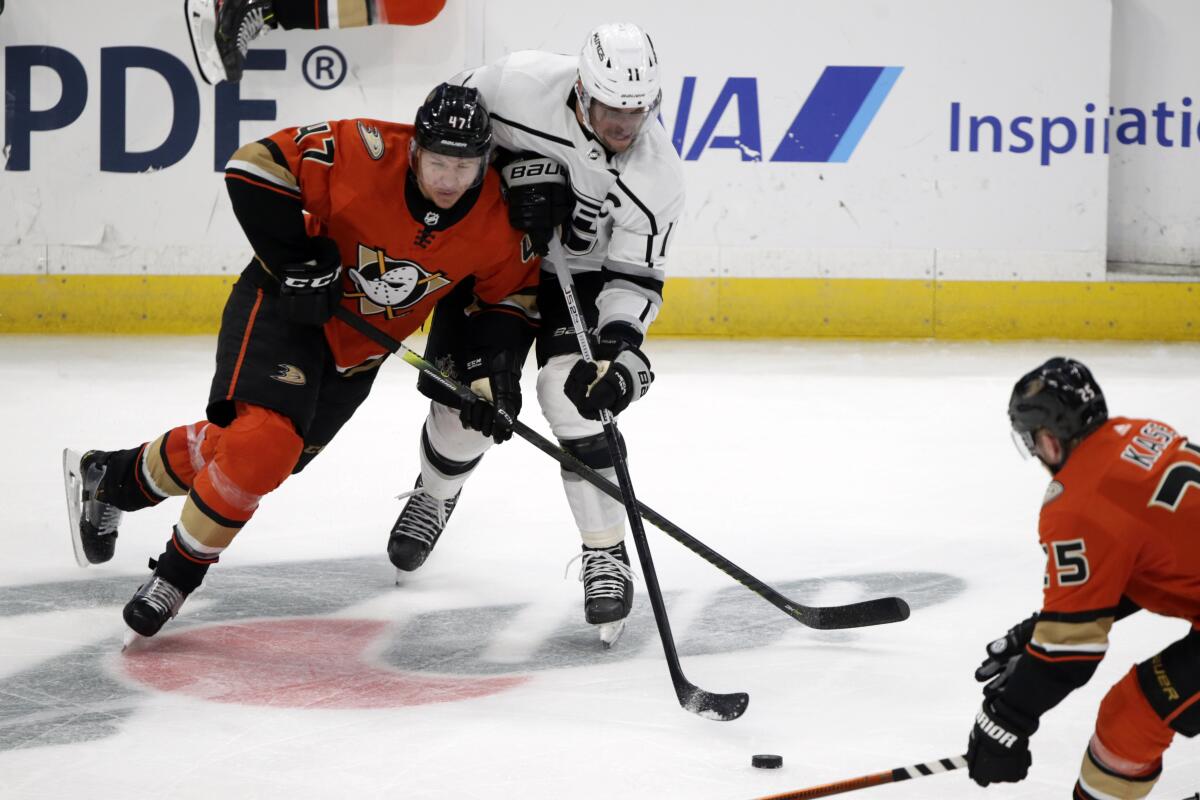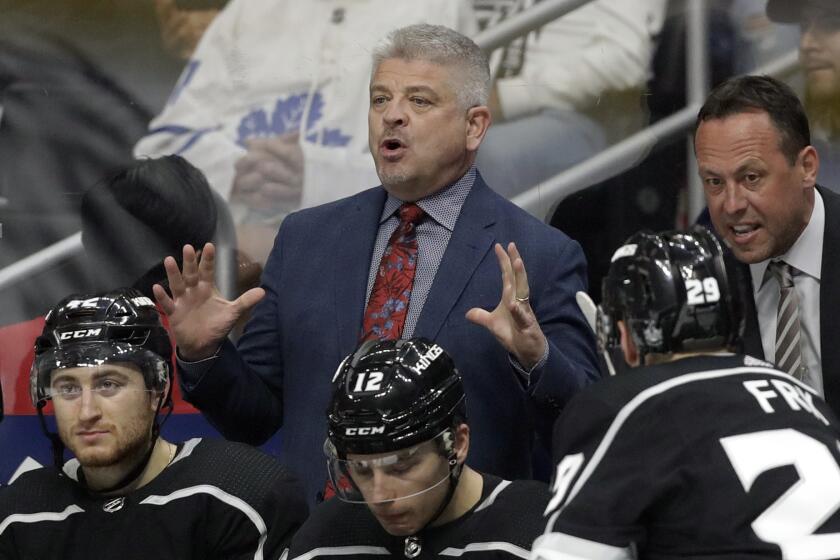Five Kings-Ducks games in 12 days? NHL announces its pandemic-altered schedule

- Share via
The Kings will open the 2021 NHL season on Jan. 14 at home against the Minnesota Wild. Two nights later, they will host the Wild again.
On Jan. 19, the Kings will welcome the Colorado Avalanche to Staples Center. Their following game? Same opponent, same place.
On and on their 56-game schedule goes, repeating the back-to-back pattern throughout almost the entirety of their pandemic-altered slate. Only two of the Kings’ contests aren’t part of a multi-game miniseries. During one stretch between April 20 and May 1, they will face the Ducks five times in 12 days.
Other teams’ schedules, which were all released by the league on Wednesday afternoon, follow a similar format — stamping an already unprecedented season with perhaps its biggest alteration yet.
“Every team will have more information on the team they’re playing,” said Kings television analyst Jim Fox. “Because they’re playing them a lot.”
There are several reasons why a mint-rated 1979 Wayne Gretzky O-Pee-Chee rookie card sold at auction last week for $1.29 million.
Plenty of other unfamiliar features about this upcoming NHL season were known prior to Wednesday’s schedule release: Extremely abbreviated training camps (the Kings’ and Ducks’ will open Dec. 31, two weeks before their regular seasons begin) capped at just 36 skaters per team; empty arenas in most markets (including both Southland teams, at least to start the season) and limited capacity in others; traveling taxi squads of four to six players to supplement customary 23-man rosters; and divisional realignment to eliminate travel between the U.S. and Canada.
But the new-look schedules might have the most tangible impact on competition itself. Teams will only play against opponents within their division, which for the Kings and Ducks includes eight contests each against the Wild, Avalanche, San Jose Sharks, Arizona Coyotes, St. Louis Blues and Vegas Golden Knights. The baseball-esque structure of the schedule will likely accentuate the familiarity — and potential bad blood — between clubs.
“It’s more of a playoff mindset,” said Fox, who played nine seasons for the Kings in the ’80s and has spent the last three decades on their broadcast team. “Every shift, you’re going to be against the same guy probably, with the matchups, and then that happens game-to-game-to-game. … If you’re playing the same teams all the time, it really intensifies, how do you find the opening? How do you find the weakness?”
The Kings, who finished next-to-last in the Western Conference last season and haven’t played a game since March, seem to have a tougher first half. Following their season-opening four-game homestand against the Wild and Avalanche, 16 of their next 23 games will be on the road, including two separate trips to St. Louis and road series at Vegas and Colorado — the top three teams in the Western Conference last season. They have a season-long six-game trip scheduled for Feb. 18 and 27.
With the NHL making a number of changes in response to the COVID-19 pandemic, Kings coach Todd McLellan knows this season will be unlike any other.
They make up for that stretch, however, with a home-heavy slate over the final two months. Their April schedule includes 11 of 16 games at home and no trips longer than two games. They’ll finish the regular season on home ice as well, hosting the Avalanche on May 7 and 8.
“For the Kings, it probably allows you to be in contention more so than if you were playing the whole league,” Fox said, noting that after preseason favorites Vegas, Colorado and St. Louis, he believes the division’s fourth and final playoff spot could be “a little bit more up for grabs than if you’re in a 15- or 16-team conference.”
The Ducks, who ended last season one spot ahead of the Kings in the standings and will also be coming off a 10-month layoff, open their season with a two-game series in Vegas on Jan. 14 and 16. After that, they don’t have a homestand or trip longer than four games until a stretch of six straight at Honda Center between March 8 and 18. Their longest trip of the season immediately follows, a six-game swing through Minnesota, St. Louis and Colorado between March 22 and 31.
And unlike the Kings, the Ducks have no other games scheduled during the 12-day stretch late in the season that includes five games between the two Southland clubs — meaning they will face their crosstown rival five consecutive times before finishing the season with road series in St. Louis and Minnesota.
“There’s more of a serious nature,” Fox said, “when you’re playing the same teams.”
The Kings and Ducks each released new alternate jerseys Monday as part of the NHL’s leaguewide “Reverse Retro” reveal.
The unique schedule format was a necessity for this mid-pandemic season. Pairing matchups into sets of two will cut down on the number of times clubs have to board a flight or check in and out of hotel rooms. It provides more flexibility in case COVID-19 outbreaks pop around around the league.
The NHL has taken other measures to try and ensure the jam-packed schedule — teams will play on average almost every other day — isn’t disrupted, jointly announcing medical protocols with the NHL Players’ Assn. on Tuesday.
Other key dates for the 2021 season include the trade deadline on April 12, the start of the playoffs (which will consist of intra-divisional matchups through the first two rounds) on May 11, and the last possible day of the Stanley Cup Final on July 9.
The 2021 expansion draft for the new Seattle Kraken franchise will take place on July 21. The NHL entry draft will be held during July 23-24. Free agency opens July 28.
But first, the NHL has to hope its schedule will hold up and that its season can survive outside of a bubble over an entire four-month slate. It will be different, and very likely more challenging.
But, as Fox noted, “this is unprecedented times. … What are you going to complain about? We’re working again. That’s phenomenal.”
More to Read
Go beyond the scoreboard
Get the latest on L.A.'s teams in the daily Sports Report newsletter.
You may occasionally receive promotional content from the Los Angeles Times.








